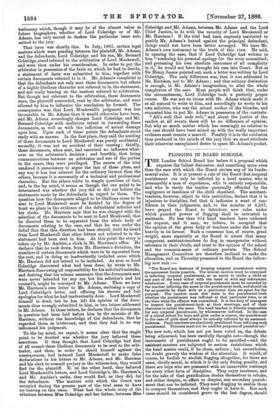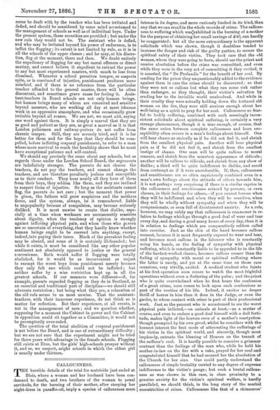FLOGGING IN BOARD SCHOOLS.
THE London School Board has before it a proposal which requires the fullest discussion, and something more even than the care with which the Board revises any of its funda- mental rules. It is at present a rule of the Board that corporal punishment can only be inflicted by a head master, who is presumably a man of experience, who is entirely responsible, and who is rarely the teacher personally offended by the negligence or insolence of the child chastised. The assistant- teachers, however, object to this restriction, declare that it is injurious to discipline, feel that it indicates a want of con- fidence in their judgments, and, to the number of 4,247, have prayed the Board to introduce new rules under which guarded powers of flogging shall be entrusted to assistants. No less than 954 head teachers have endorsed the request, and it may, we believe, be accepted that the opinion of the great body of teachers under the Board is heavily in its favour. Such a consensus has, of course, great weight, more especially as the Board is aware that many competent assistant-teachers do flog in emergencies without reference to their chiefs, and trust to the opinion of the school and the common-sense of ordinary parents. The School Management Committee are therefore inclined to make the alteration, and on Thursday presented to the Board the follow- ing new rule :— "The Board are desirous of keeping corporal punishment within the narrowest limits possible. The utmost caution must be exercised in inflicting corporal punishment, so as never to strike a child on any part of the head either with the hand or with any instrument whatsoever. Every ease of corporal punishment must be recorded by the teacher inflicting the same in the punishment-book, and should as far as possible be dealt with at a particular time set apart for the purpose. The teacher must also state in the punishment-book whether the punishment was inflicted at that particular time, or at the time when the offence was committed. It is the duty of managers to inspect the punishment-book at their meetings, and of their chairman to initial the same. The head teacher is directly responsible for any corporal punishment, by whomsoever inflicted. In the case of a mixed school for boys and girls under a master, the punishment in the case of girls must always be actually inflicted by an assistant- mistress. Pupil-teachers are absolutely prohibited from inflicting such punishment. Pointers mast not be used for purposes of punishment."
The new rule, which has not yet been voted on, the debate being adjourned, has been carefully thought out—though the instrument of punishment ought to be specified—and the assistant-masters are subjected to serious restrictions which the head master could, if he chose, enforce ; but nevertheless, we doubt gravely the wisdom of the alteration. It would, of course, be foolish to abolish flogging altogether, for there are cases, chiefly moral, in which it is the only fitting penalty, and there are boys who are possessed with an immovable contempt for every other form of discipline. They enjoy insolence, and for the sake of that gratification deafen themselves to rebuke, and either despise, or affect to despise, any secondary punish- ment that can be inflicted. They need flogging to enable them to conquer themselves, and they ought to have it. But such cases should be considered grave to the last degree, should never be dealt with by the teacher who has been irritated and defied, and should be considered by some mind accustomed to the management of schools as well as of individual boys. Under the present system, these securities are provided ; but under the new rule they would not be. The assistant who is defied, and who may be irritated beyond his power of endurance, is to inflict the flogging ; its extent is not limited by rule, as it is in all the schools of the upper classes ; and he may, at his discre- tion, flog at the moment, there and then. We doubt entirely the expediency of flogging for any but moral offences or direct mutiny, and cannot believe it expedient to entrust the power to any but most experienced masters, with much to lose from dismissal. Whenever a school perceives temper, or suspects spite, or is convinced of injustice, punishment produces mere mischief, and if there is no reference from the particular teacher offended to the general master, there will be often discontent, and sometimes grave cause for feeling it. Assis- tant-teachers in Board schools are not only human beings, but human beings many of whom are conceited and sensitive beyond measure, who are working all day at most irksome work in an oppressive atmosphere, and who occasionally grow irritable beyond all reason. We are not, we must add, saying one word against them. It is simply a marvel that they are as good and patient as they are, as great a marvel as it is that London policemen and railway-porters do not suffer from chronic temper. Still, they are severely tried, and it is far better for them and for the boys that they should be com- pelled, before inflicting corporal punishment, to refer to a man whose mere survival to reach the headship shows that he must have exceptional patience and self-control.
We should say precisely the same about any schools, but as regards those under the London School Board, the arguments are indefinitely stronger. The parents do not choose the teachers, do not pay the teachers, and cannot change the teachers, and are therefore peculiarly jealous and susceptible as to their conduct. They hear nearly all they hear of them from their boys, they seldom like them, and they are inclined to suspect them of injustice. So long as the assistants cannot flog, the parents do not care ; but the moment that power is given, the fathers will grow suspicious and the mothers fierce, and the system, always, be it remembered, liable to unpopularity because of compulsion, may become seriously disliked. It is most unwise to create that dislike, espe- cially at a time when workmen are unreasonably sensitive about dignity, when the tendency of opinion is strongly against inflicting physical pain, and when those who gcvern are so uncertain of everything, that they hardly know whether human beings ought to be coerced into anything, except, indeed,into paying their taxes. Much of the prevalent feeling may be absurd, and some of it is certainly ill-founded ; but while it exists, it must be considered like any other popular sentiment not absolutely opposed to justice or the general cmvenience. Both would suffer if flogging were totally abolished, for it would be as inconvenient as unjust to exempt the worst boys from punishment merely because they only felt one which could not be indicted; but neither suffer by a wise restriction kept up in all the greatest schools. If our manners were different—if, for example, parents regarded flogging as they do in Scotland, as an essential and traditional part of discipline—we should still advocate restriction ; but being what they are, a relaxation of
the old rule seems to us most unwise. That the assistant- teachers, with their immense experience, do not think so is matter for reflection. But their experience, at all events, is not in the management of men ; and we question whether, supposing for a moment the Cabinet in power and the Cabinet in opposition could sit together as a Committee, it would not be peremptorily over-ruled.
The question of the total abolition of corporal punishment is not before the Board, and is one of extraordinary difficulty ; but we are not sure that the experiment might not be tried for three years with advantage in the female schools. Flogging still exists at Eton, but the girls' high-schools prosper without it, and so, we suspect, might schools in which the oldest girl is usually under thirteen.







































 Previous page
Previous page